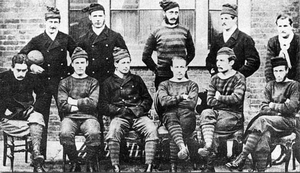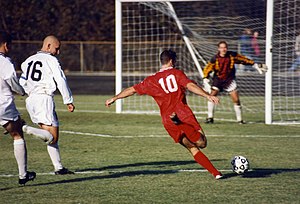|
Association football, commonly known as football or soccer, is a sport played between two teams of eleven players with a spherical ball. It is the world’s most popular sport. The game is played on a rectangular field of grass or green artificial turf, with a goal in the middle of each of the short ends. The object of the game is to score by driving the ball into the opposing goal. In general play, the goalkeepers are the only players allowed to touch the ball with their hands or arms, while the field players typically use their feet to kick the ball into position, occasionally using their torso or head to intercept a ball in midair. The team that scores the most goals by the end of the match wins. If the score is tied at the end of the game, either a draw is declared or the game goes into extra time and/or a penalty shootout, depending on the format of the competition. The Laws of the Game, published in England by the Football Association in 1863, remain the basis for the way the sport is played today. Association football is governed internationally by FIFA, which organises the FIFA World Cup every four years.
Main article: History of association football

England playing Scotland in the first-ever international football game (The Oval, 1872) 
The Royal Engineers team who reached the first FA Cup final in 1872 The modern rules of association football are based on the mid-19th century efforts to standardise the widely varying forms of football played at the public schools of England. The history of football in England dates back to at least the Middle Ages. The Cambridge Rules, first drawn up at Cambridge University in 1848, were particularly influential in the development of subsequent codes, including association football. The Cambridge Rules were written at Trinity College, Cambridge, at a meeting attended by representatives from Eton, Harrow, Rugby, Winchester and Shrewsbury schools. They were not universally adopted. During the 1850s, many clubs unconnected to schools or universities were formed throughout the English-speaking world, to play various forms of football. Some came up with their own distinct codes of rules, most notably the Sheffield Football Club, formed by former public school pupils in 1857, which led to formation of a Sheffield FA in 1867. In 1862, John Charles Thring of Uppingham School also devised an influential set of rules. These ongoing efforts contributed to the formation of The Football Association (The FA) in 1863, which first met on the morning of 26 October 1863 at the Freemasons’ Tavern in Great Queen Street, London. The only school to be represented on this occasion was Charterhouse. The Freemason’s Tavern was the setting for five more meetings between October and December, which eventually produced the first comprehensive set of rules. At the final meeting, the first FA treasurer, the representative from Blackheath, withdrew his club from the FA over the removal of two draft rules at the previous meeting: the first allowed for running with the ball in hand; the second for obstructing such a run by hacking (kicking an opponent in the shins), tripping and holding. Other English rugby football clubs followed this lead and did not join the FA, or subsequently left the FA and instead in 1871 formed the Rugby Football Union. The eleven remaining clubs, under the charge of Ebenezer Cobb Morley, went on to ratify the original thirteen laws of the game. These rules included handling of the ball by "marks" and the lack of a crossbar, rules which made it remarkably similar to Victorian rules football being developed at that time in Australia. The Sheffield FA played by its own rules until the 1870s with the FA absorbing some of its rules until there was little difference between the games. The laws of the game are currently determined by the International Football Association Board (IFAB). The Board was formed in 1886 after a meeting in Manchester of The Football Association, the Scottish Football Association, the Football Association of Wales, and the Irish Football Association. The world’s oldest football competition is the FA Cup, which was founded by C. W. Alcock and has been contested by English teams since 1872. The first official international football match took place in 1872 between Scotland and England in Glasgow, again at the instigation of C. W. Alcock. England is home to the world’s first football league, which was founded in Birmingham in 1888 by Aston Villa director William McGregor. The original format contained 12 clubs from the Midlands and the North of England. FIFA, the international football body, was formed in Paris in 1904 and declared that they would adhere to Laws of the Game of the Football Association. The growing popularity of the international game led to the admittance of FIFA representatives to the International Football Association Board in 1913. The board currently consists of four representatives from FIFA and one representative from each of the four British associations. Today, football is played at a professional level all over the world. Millions of people regularly go to football stadiums to follow their favourite teams, while billions more watch the game on television or on the internet. A very large number of people also play football at an amateur level. According to a survey conducted by FIFA published in 2001, over 240 million people from more than 200 countries regularly play football. While football has the highest global television audience in sport, its simple rules and minimal equipment requirements at amateur level, have no doubt aided its growth in terms of participation. In many parts of the world football evokes great passions and plays an important role in the life of individual fans, local communities, and even nations. The Côte d’Ivoire national football team helped secure a truce to the nation’s civil war in 2006 and it helped further reduce tensions between government and rebel forces in 2007 by playing a match in the rebel capital of Bouaké, an occasion that brought both armies together peacefully for the first time. By contrast, football is widely considered to be the final proximate cause in the Football War in June 1969 between El Salvador and Honduras. The sport also exacerbated tensions at the beginning of the Yugoslav wars of the 1990s, when a match between Dinamo Zagreb and Red Star Belgrade devolved into rioting in March 1990
From Wikipedia, the free encyclopedia : Soccer |
|||||||||||||||||||||||||



